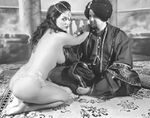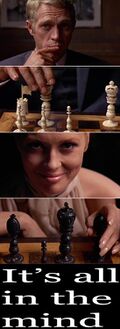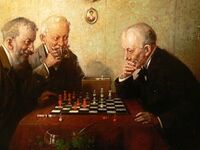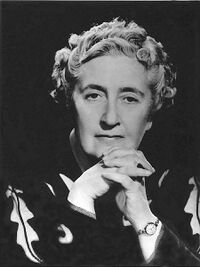Chess

“I'll be black.”
“I misread the invitation!”
Chess is a popular game of chance played by people who fear human contact. It should not be confused with Checkers, a game known for being played by people significantly less intelligent than chess players. Chess was a popular pastime for centuries among prisoners, each of whom sought to topple their king the fastest and then dig their way out as soon as possible.
The game would have languished there if it hadn't been for American-Icelandic Grand Master Chessman Bobby Fischer. In 1972 he beat Boris Spassky and the Soviet Mafia in a thrilling series of games in Reykjavik. Who said the Americans could only play Fizzbin with emotional Vulcans!?
History
Historians agree that the game's name is widely held to be a derivation of "chest[1]," and that the first games were played on diagrams carved around the nipples of dead bodies. They came to be referred to as "boards" for their stiffness. The smell and possible maggots might have made the game unpleasant, and it was considered difficult to play on the corpses of well-endowed females. So from the 15th century on only male cadavers were used.
Given its smelly origin, the game naturally acquired several French terms over time[2], the most well known of which is "checkmate", derived from "j'ec matte", meaning "I grope you" or "Surprise! You have been groped". This may refer to an endgame ritual of which French historian Tacitus IV[3] wrote:
- "A victor having been established by fair processes, that person does henceforth receive the liberty of fondling the hidden parts of the vanquished, who may at appropriate times reposition himself, saying 'I adjust', and who, when sufficient time is deemed to have elapsed, may demand that the victor desist forthwith, at which point the vanquished assumes the role of the victor, and vice versa, and so on."[4]
Chess Rules
Chess is played by two people[5] They sit opposite each other with a board between them that has 32 of pieces of carved two toned colored plastic. These chess men[6] move in confusing ways. Each player takes his or her turn, moving pieces until one of two conditions is satisfied. Either a player clearly humiliates his or her opponent with their display of board game blitzkrieg or they both yawn and agree on a draw.
There are a few other rules, according to the FIDE[7] Official Tournament Rules:
- White First rule: White always goes first. This rule can be traced back to the time of slavery, when whites always got to go first, and blacks pretty much never got to go at all. Note that there were very few good black players to arise out of this period of chess. Very popular in South Africa until recently.
- The Touch-Move rule: if a player attempts to molest their opponent before a checkmate is declared, they must immediately move out of the playing area.
- 'J'ajuste' : 'I adjust' - an exception to the 'Touch-move' rule. If a player purrs at another player in French, he or she may touch his or her opponent in various ways.
- I adjust: This can be said in English to announce the adjustment of a player's own underwear. To adjust the opponent's underwear, this must be said twice, first in French and then in English.
The rules of chess were first codified in England in 1863. Prior to this, games often involved dozens of pieces per side, and white and black were controlled by different villages, each arguing and fighting over the next move. Public schools in England began playing the game before the leading chess players of the time decided to create a set of rules that everyone could follow (especially if you were working class and a bit gobby).
A split occurred over the issue of hacking - kicking the shins of an opponent without any attempt to capture a piece. The majority of those present at the Freemasons and World Wide Conspiracy Pub voted to outlaw hacking, whilst a sizeable minority stormed out of the meeting and founded the game of draughts (known as checkers in the Third World and the USA), where kicking your opponents' shins is still permitted to this day. Contrary to popular myth, chess players, upon having put the enemy king in a position where capture is inevitable, do not say 'checkmate'; the official term is actually 'howzaaaaaat!', which is one of many throwbacks to the days when chess was first evolving from the game of cricket[8].
The Pieces
- King : The King is the most important piece on the board. It is also the slowest and least useful piece as well. The King can only move one space in any direction except in special circumstances when someone cheats and drops some Viagra in his cocoa. If this happens, the King chucks off his robes and puts on a white tuxedo and a guitar to knock down all the opposing pieces into the capture zone and avoid checkmate.
- Queen : The Queen does as she's bloody well told, if she knows what's good for her. She is also widely regarded as the game's sex symbol. Many young (male) chess players form a crush and will hide this piece in their pencil box after the end of the game.
- Pawn: Pawns are the "foot soldiers" of chess, in that, like actual foot soldiers, they line up and mindlessly march forward to their slaughter. The name of the piece is derived from the 1337-language "pwn," meaning "to dominate," and suggests the piece was named ironically. All of the pawns seem to share a goal of marching to the end of the board and performing an SRS (Sex Reassignment Surgery), after which they become eligible to become the king's wife.
- Bishop : The Bishop is the only chess piece that looks like an erect penis. Generally considered the most pious of all the pieces, bishops move diagonally to represent their historical practice of squeezing through small cracks in cathedral walls in order to sneak out during the recessional and get hammered.
- Knight: This piece has a dark and deceptive past. The Knight can jump five times its board game height to drop behind an enemy piece and knife it in the back.
- Rook : The Rook (Corvus frugilegus) is a crow-like bird. In chess, however, they're shaped like castle towers. Although designed to appear as buildings, Rooks are inexplicably capable of movement.
Chess Notations and Terminology
In common with many games, chess comes with its own lexicon. Players wanting to achieve Grand Master Status need to learn these or at least have a friend in the audience that they can secretly communicate with to sound 'authoritative' when required[9].
- Castling: Taking one's pieces and stating that they are in another castle so that one is completely safe and can chortle at one's opponent as they try to assault one's impenetrable fortress.
- Check: Telling your opponent that you're going to win on the next move if he or she doesn't prevent it. This is generally considered a stupid thing to do.
- Checkmate!?: An Australian player demanding to be paid before laying a finger on any piece.
- Discovered Check: Opening an envelope not addressed to you and sticking the money in your own bank account.
- Double Check: Pushing an opponent against the boards and body slamming said opponent twice. May result in boarding and/or cross-checking penalties.
- En Passant: French for 'Oh là là'. Playing footsie under a table to unsettle your opponent.
- Fork: Positioning a piece such that it attacks two of the opponent's pieces at once, then closing one's eyes and reciting, "eenie, meenie, miney, moe...", before attacking one of the pieces with cutlery. See also Spoon.
- ????: Often seen in chess notation. Means someone has dropped a personal gas bomb to encourage a time out.
- !!!!: Another chess notation that indicates foul language or an exchange of paternity references between opponents in the course of a game.
- Pin: Employing Greco-Roman techniques by removing your clothes, throwing your opponent to the carpet, and sitting on him or her. Most effective in a timed game, especially when done at the beginning of your opponent's turn.
- Queening: A game where the chess players opt to play in drag.
- Skewering: Thrusting your knight's lance across the chess board and impaling one's opponent. Note: May result in the filing of criminal charges.
- Stalemate: Suggesting the other player drop his or her partner and live with cheese instead.
- Stalling: The only move a player can make will checkmate or check their king. This player may cheat. This player may also throw a tantrum. But, whatever you do, do not attempt to move for him, or all hell will break loose.
- Zugzwang: It's a complicated German word which means that your opponent has to make a move no matter what and the move he makes will be a great advantage to you.
Chess Strategies
Although it has recently been proven that chess does not require much strategy or skill, there were a few cultures in history that strongly believed otherwise. Here are some of the strategies that they thought would work:
- American Defense: Drone strike to finish off your opponent and spend rest of the time playing Solitaire.
- Empire Defense: This play only works when you play white. Declare yourself owner of all the squares and subject the black pieces to slavery, thus making their king your bitch pawn.
- Cold Shoulder: An extremely effective and annoying maneuver which involves doing absolutely nothing during your turn until your opponent gets fed up and leaves, automatically making you the winner. Not to be played in a timed game.
- Dutch Variation:Drugs stashed inside the board where the pieces are kept.
- Enigma Variations:Talk only in code and melodic fragments
- French Defense: Line up five of your pawns in front of your king. Express shock when your opponent simply moves his queen around them. Surrender.
- King's Pawn Gambit: Sacrifice your King's pawn in order to gain an advantage somehow. Not to be confused with the even more successful King's Bishop Choirboy Gambit.
- King's Gambit: Sacrifice your King in order to gain an advantage in development. Often considered an unacceptably risky move.
- Knocking All The Pieces Off The Board And Spitting In Your Opponent's Face or the 'Big Fuck You'. This one is usually considered a last resort.
- Najdorf: Memorize 35 moves of opening theory, and then lose the game in 23 moves after your opponent plays the Sveshnikov, which you forgot to memorize. And yes, it really is pronounced "Nye-dorf". Also called the Sicilian Defense so take care of your head.
- Queen's Gambit. Your Queen offers to sleep with the opposing King to achieve a game advantage.
- Suicide Chess. Be careful with who and where you play this. i.e. Middle East.
- R2-D2 & C3PO defense: Let the wookie win.
- Russian Defense. Annex the seat your opponent wants to use in the game. Make them stand for the rest of the game.
- The "Look Over There" Defense: Exclaim "Look over there!", and move around the pieces so that you have an advantage.
- The Role Reversal: Playable in an informal setting or after a formal adjournment when your opponent has obtained the stronger position. Upon returning to the table sit down in your opponent's chair. Appear engrossed in the position and do not respond to your opponent's objections until he resigns or accepts the reversal.
Players who invent a series of opening moves are rewarded with chess playing strategies named in their honor. The Jennifer Lopez Opening involves stripping off your pants and parking your bare ass in front of your chess pieces. Only try the Andersson-Rice-Ulvaeus Excuse if you have no idea what to do next.
Chess Philosophy
Chess is viewed by some as a workout. Moving your fingers to and fro, up and down the chessboard, is believed to build your lats and traps and generally get you massively "pumped". Others view chess as a philosophy. They see chess a a perfect convergence between the realms of psychology, meta-physics, and raw intelligence. These ideologies are incorrect due to the lack of evidence of any knowledge ever gained from playing chess.
The real point of chess is to waste your time in a "productive" manner, as opposed to video games, watching TV, or editing a wiki. There is also believed to be an aspect of mental abuse, as some kings and bishops have claimed that "chess size matters." The moral of chess is that you can learn the rules in an afternoon, and learn to beat the basic computer programs in a few weeks and rack up criminal records, bad credit, red flags on your resumes. The so called wisdom of age is realizing that this chess shit has no future for you.
Women's Titles
Women were originally banned from playing chess as it was considered obscene for them to touch a king or a bishop[10]. They had to play wearing white gloves and a large broad brimmed hat to prevent immoral thoughts. This social attitude only changed in the 1920s when Agatha Christie wrote books like Murder at the Chess Club and Eight Little Pawns made the game acceptable for women to play.
Women's titles are also offered for skilled female chess players; these are WGM, WIM, WFM and WCM. Chess is considered to be a male-dominated sport, which is why FIDE offers female titles to encourage more women to play chess. Also, the pieces in men's games can be pretty heavy and rough, so the women's tournaments use lighter and better lubricated pieces. Women, unlike male chess players, are allowed to dress pretty casually while playing in tournaments. Also, women's tournaments are watched more, because the checkmate procedures are believed to be considerably more interesting when two women are engaging in them.
Variants
Various variants of chess have been created, largely because the game can often get really boring and minor tweaks to the rules, such as en passant, were insufficiently amusing. Notorious variants of chess include the following:
- In pawnography, the chess pieces are in the form of disrobed people. It is the only variant of chess in which losing is completely satisfying.
- Extreme Beach Chess is a more strenuous alternative to volleyball for ocean-side weekends. It is related to pawnography.
- In Aztec Chess, White starts the game with 16 bishops, while Red starts the game with 16 pawns. Some reviewers believe that this variant is not amusement but merely allegory.
- Gangsta Chess is played in the urban centers of the United States, and lately in the White House. Games are brief, as one side always tips over its own king.
- Chinese Chess is played for control of drugs, triads and Jackie Chan fans.
- In Jim Crow Chess, also known as Apartheid Chess, the black and the white pieces are required to each stay on their own side of the board. The fun comes in arguing about which side of the board is better, as neither side can truly win.
Famous players

The world's best chess players have been from Russia, as its modern, stable, and democratic government provides no outlet for citizens who specialize in stealth and treachery. Famous Russian "grand wizards" of chess include Garry Kasparov, Anatoly Karpov, and Bobby Fischer. The latter became famous for thinking "outside the lines" both on and off the chessboard.
Machines have made great strides in freeing humans from the burden of playing chess. A famous chess-playing machine was Deep Purple, though it retired from the game citing its desire "to spend more time with my family of 1970s digital calculators."
In the Internet era, chess will be played neither by identifiable persons nor by machines, but rather automatically, on websites such as Red Hot Pawn.
References
- ↑ The myth it was created in India as Game of Elephants is wide of the mark.
- ↑ French players have received widespread acclaim for refining the act of mating and for discovering hundreds of previously unknown checkmate positions.
- ↑ Great grandson of three prequels.
- ↑ In Latin: "Lorem ipso dollar sit amex, boa constrictor admanpiscing elit snob, Lidl sed do quasimodo 'tempor tempor mi gealousee' incididunt ut Lahore et Doha Magna Carta. Ut Traci enim ad minim service fee, quids in Nostradamus excretum ultimo laboris party Nissan Almera ut Christina Aguilera ex ea commando Britney Spears sin pantum." Clear?
- ↑ At tournaments this rule is relaxed. Chess players are now equipped with managers, image rights consultants, sponsors, weird men in tight shirts and funny glasses.
- ↑ Or chess people these days.
- ↑ Typically, the English let the French take over the game when it came to international games. Chess is now run by the Fédération Internationale de Échecs (FIDE) or FIDO in English speaking countries.
- ↑ The origins story of chess from cricket can be read in 120 Days of Soddit by Piero-Luigi Pastrami.
- ↑ Russian players always won this way.
- ↑ Virginia Woolf was an early flouter of these rules but look where that took her!
| Featured version: 4 November 2014 | |
| This article has been featured on the main page. — You can vote for or nominate your favourite articles at Uncyclopedia:VFH. | |








